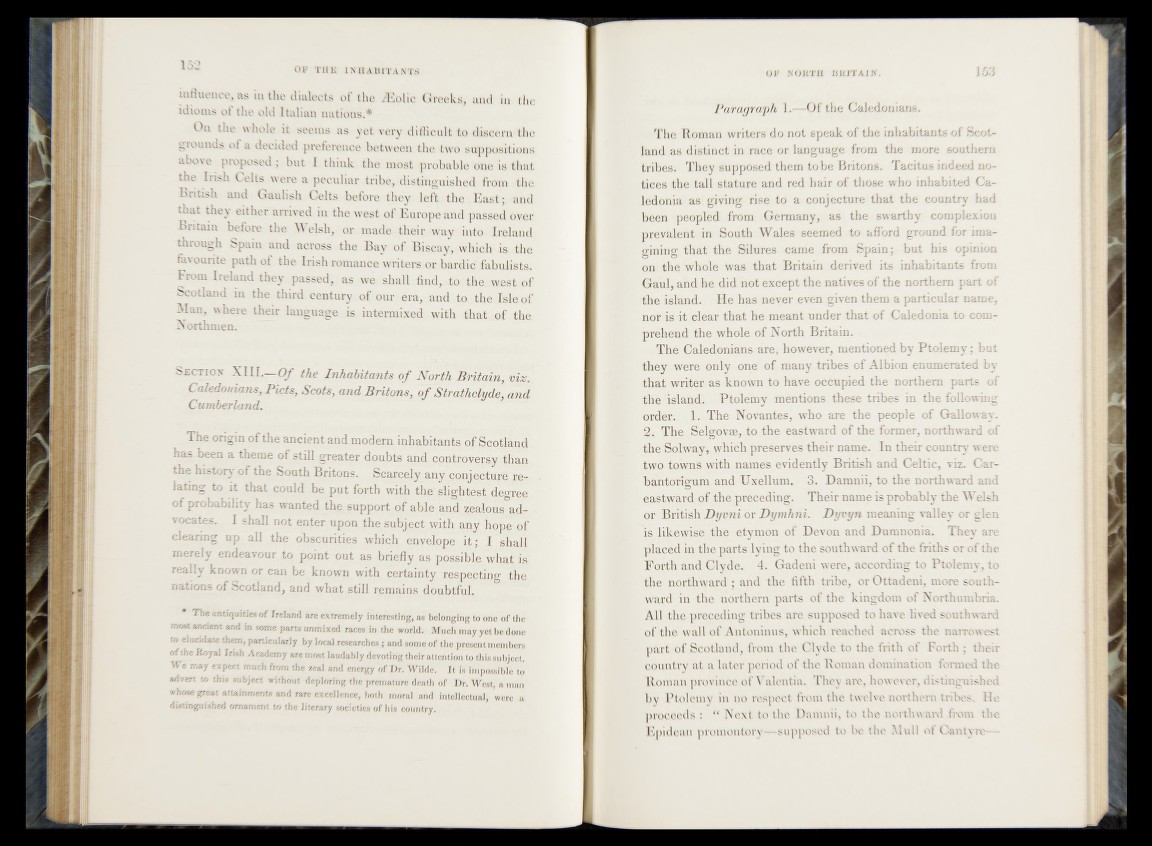
influence, as in the dialects of the JSolic Greeks, and in the
idioms of the old Italian nations.*
On the whole it seems as yet very difficult to discern the
grounds of a decided preference between the two suppositions
above proposed; but I think the most probable one is that
the Irish Cells were a peculiar tribe, distinguished from the
British and Gaulish Celts before they left the East; and
that they either arrived in the west of Europe and passed over
Britain before the Welsh, or made their way into Ireland
through Spain and across the Bay of Biscay, which is the
favourite path of the Irish romance writers or bardic fabulists.
From Ireland they passed, as we shall find, to the, west of
Scotland in the third century of our era, and to the Isle of
Man, where their language is intermixed with that of the
Northmen.
S e c t io n X III.—O f the Inhabitants o f North B rita in , § j j f
Caledonians, P iets, Scots, and Britans, o f Strathclyde, a nd
Cumberland.
The origin of the ancient and modem inhabitants of Scotland
has been a theme of still greater doubts and controversy than
the history of the South Britons. Scarcely any conjecture relating
to it that could be put forth with the" slightest degree
of probability has wanted the support of able-and zealous ad- *
vocates. I shall not enter upon the subject with any hope of
clearing up all the obscurities which envelope it; I shall
merely endeavour to point out as briefly as possible what is
really known or can be known with certainty respecting the
nations of Scotland, and what still remains doubtful.
* The antiquities of Ireland are extremely interesting, as belonging to one of the
meet andent and in some parts unmixed races in the world. Much may yet be done
to elucidate them, particularly by local researches; and some of the present members
of the Royal Irish Academy are most laudably devoting their attention to this subject.
W e may expect mtich from the zeal and energy of Dr. Wilde, It Is Impossible to
advert to this subject without deploring the premature death of Dr. West, a man
whose great attainment» and rare excellence, both moral and Intellectual, were a,
distinguished ornament to the literary societies of his country.
Paragraph 1,~—Of the Caledonians.
The Roman writers do not speak of the inhabitants of Scotland
as distinct in race or language from the more southern
tribes. They supposed them to be Britons. Tacitus indeed notices
the tall stature and red hair of those who inhabited Caledonia
as giving rise to a conjecture that the country had
been peopled from Germany, as the swarthy complexion
prevalent in South Wales seemed to afford ground for imagining
that the Silures came from Spain; but his opinion
on the whole was that Britain derived its inhabitants from
Gaul, and he did not except the natives of the northern part of
the island. He has never even given them a particular name,
nor is it clear that he meant under that of Caledonia to comprehend
the whole of North Britain.
The Caledonians are, however, mentioned by Ptolemy ; but
they were only one of many tribes of Albion enumerated by
that writer as known to have occupied the northern parts of
the island. Ptolemy mentions these tribes in the following
order. 1. The Novantes, who are the people of Galloway.
2. The Selgovae, to the eastward of the former, northward of
the Solway, which preserves their name. In their country were
two towns with names evidently British and Celtic, viz. Oar-
bantorigum and Uxellum. 3. Damnii, to the northward and
eastward of the preceding. Their name is probably the Welsh
or British Dy vni or Dymhni. D yvyn meaning valley or glen
is likewise the etymon of Devon and Dumnonia. They are
placed in the parts lying to the southward of the friths or of the
Forth and Clyde. 4. Gadeni were, according to Ptolemy, to
the northward ; and the fifth tribe, or Ottadeni, more southward
in the northern parts of the kingdom of Northumbria.
All the preceding tribes are supposed to have lived southward
of the wall of Antoninus, which reached across the narrowest
part of Scotland, from the Clyde to the frith of Forth ; their
country at a later period of the Roman domination formed the
Roman province of Valentia. They are, however, distinguished
by Ptolemy in no respect from the twelve northern tribes. He
proceeds : ** Next to the Damnii, to the northward from the
E pi dean promontory-supposed to be the Mull of Cantyre—